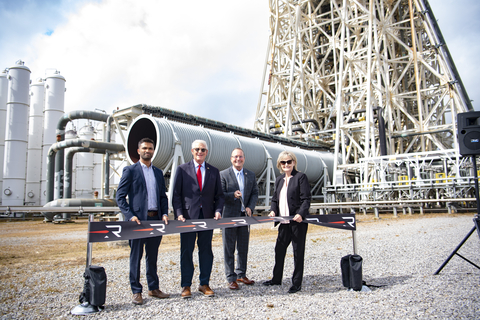Financial News
Rocket Lab Opens Archimedes Engine Test Stand at Stennis Space Center in Mississippi
The complex located at the Center’s A-3 Test Stand will be used to develop and test the Archimedes reusable engines, fast-tracking Rocket Lab’s development of the Neutron launch vehicle.
Rocket Lab USA, Inc. (Nasdaq: RKLB) (“Rocket Lab” or “the Company”), a leading launch and space systems company, today kicked off operations for testing the Archimedes engine with a ribbon cutting ceremony at NASA’s historic Stennis Space Center in Mississippi. The Archimedes Test Complex will be home to engine testing for the 165,000 lbf engines to be used on Rocket Lab’s reusable Neutron rocket.
This press release features multimedia. View the full release here: https://www.businesswire.com/news/home/20221104005624/en/

Rocket Lab's Vice President of Launch Systems, Shaun D'Mello, Senator Roger Wicker, Stennis Space Center Director Dr. Richard Gilbrech, and Senator Cindy Hyde-Smith participated in a ribbon cutting to kick off operations at Rocket Lab's Archimedes Test Complex for the Neutron launch vehicle at Stennis Space Center. (Photo: Business Wire)
The Archimedes Test Complex is located across a 1 million square foot area at the Stennis Space Center’s A Test Complex and includes use and development of existing infrastructure of the A-3 Test Stand to develop and test Neutron’s Archimedes engines. With the opening of the Archimedes Test Complex, Rocket Lab will be able to create dozens of new jobs and make significant capital investments in the state of Mississippi.
Neutron is Rocket Lab’s reusable rocket in development, designed as a cost-effective, reliable, and responsive launch service to help build mega-constellations, deliver large spacecraft to low-Earth orbit, geostationary orbit, and interplanetary destination. Neutron is also being designed to be human spaceflight capable in future.
Rocket Lab Founder and CEO, Peter Beck, says: “It was only a few weeks ago when we announced Stennis as the location of our Archimedes Test Complex and we’re already fast at work to get the site up and running to deliver Neutron. Thanks to our partnership with NASA and the state of Mississippi, we can begin to develop the existing infrastructure and test stand at Stennis to fast-track Neutron’s first launch. We look forward to breathing fire in the great state of Mississippi.”
Rocket Lab Vice President of Launch Systems, Shaun D’Mello, says: “It is thrilling to say we’ve reached the next step in the development of Neutron as we begin operations at the Archimedes Test Complex at Stennis. We are excited to tap into the workforce in the area to fast track Neutron’s development.”
The Archimedes Test Complex will complement the under-construction Neutron Production Complex and launch site at Wallops Island, within the NASA Wallops Flight Facility and Mid-Atlantic Regional Spaceport on Virginia’s Eastern Shore. Together, the two sites can create hundreds of jobs on over two million square feet of operations for Neutron’s production, testing, and launch facilities.
ADDITIONAL COMMENTS (as per initial press release):
- The Governor of Mississippi, Tate Reeves: “When it comes to the aerospace industry, it’s all systems go in Mississippi. That’s because our state offers a prime location for innovative research, well-trained workers, and innovative technology development. Rocket Lab is a wonderful addition to the impressive range of global leaders who call NASA’s Stennis Space Center home and I’m excited to welcome them here.”
- U.S. Senator Roger Wicker: “American leadership in outer space runs through Mississippi, and it is great to see more companies partnering with Stennis Space Center as a growing hub of our nation’s aerospace industry. I appreciate that Rocket Lab is using Stennis’s 'A-3' test stand, which Congress saved from demolition in 2010. Rocket Lab will bring quality jobs and technology to Mississippi for years to come.”
- U.S. Senator Cindy Hyde-Smith: “The Stennis Space Center has a special place in American aerospace history, and Mississippi eagerly welcomes Rocket Lab to use this fantastic test facility to add to this legacy. Its work will continue Stennis’ key role in development and testing of the engines that will help usher in a new generation of achievements in aerospace and space exploration. I particularly appreciate that the Rocket Lab agreement involves partnership with NASA, the State of Mississippi, and our wonderful Gulf Coast.”
- U.S. Congressman Steven Palazzo: “I applaud Rocket Lab on their decision to utilize the unique facilities at Stennis Space Center to further their space missions,” said Congressman Steven Palazzo. “South Mississippi has long been a staple in the pathway to space for both the public and private sectors. Not only the infrastructure, but the people too, create a receptive environment for business partnerships. I look forward to Rocket Lab’s future at Stennis and in space innovation and exploration.”
- Stennis Space Center Director: “We are pleased that Rocket Lab selected Stennis Space Center for development of its new test complex,” Stennis Space Center Director Rick Gilbrech said. “With finalization of this agreement, we look forward to working with Rocket Lab as it develops and moves forward in achieving its space goals. This represents an exciting opportunity not only for Stennis but also for the Gulf Coast region and the entire state of Mississippi.”
+ Images & Video Content
www.rocketlabusa.com/about-us/updates/link-to-rocket-lab-imagery-and-video/
+ FORWARD-LOOKING STATEMENTS
This press release may contain certain “forward-looking statements” within the meaning of the Private Securities Litigation Reform Act of 1995, Section 27A of the Securities Act of 1933, as amended, and Section 21E of the Securities Exchange Act of 1934, as amended. All statements, other than statements of historical facts, contained in this release, including statements regarding our expectations of financial results for the third quarter of 2022, strategy, future operations, future financial position, projected costs, prospects, plans and objectives of management, are forward-looking statements. Words such as, but not limited to, “anticipate,” “aim,” “believe,” “contemplate,” “continue,” “could,” “design,” “estimate,” “expect,” “intend,” “may,” “might,” “plan,” “possible,” “potential,” “predict,” “project,” “seek,” “should,” “suggest,” “strategy,” “target,” “will,” “would,” and similar expressions or phrases, or the negative of those expressions or phrases, are intended to identify forward-looking statements, although not all forward-looking statements contain these identifying words. These forward-looking statements are based on Rocket Lab’s current expectations and beliefs concerning future developments and their potential effects. These forward-looking statements involve a number of risks, uncertainties (many of which are beyond Rocket Lab’s control), or other assumptions that may cause actual results or performance to be materially different from those expressed or implied by these forward-looking statements. Many factors could cause actual future events to differ materially from the forward-looking statements in this release, including risks related to the global COVID-19 pandemic; risks related to government restrictions and lock-downs in New Zealand and other countries in which we operate that could delay or suspend our operations; delays and disruptions in expansion efforts; our dependence on a limited number of customers; the harsh and unpredictable environment of space in which our products operate which could adversely affect our launch vehicle and spacecraft; increased congestion from the proliferation of low Earth orbit constellations which could materially increase the risk of potential collision with space debris or another spacecraft and limit or impair our launch flexibility and/or access to our own orbital slots; increased competition in our industry due in part to rapid technological development and decreasing costs; technological change in our industry which we may not be able to keep up with or which may render our services uncompetitive; average selling price trends; failure of our launch vehicles, spacecraft and components to operate as intended either due to our error in design in production or through no fault of our own; launch schedule disruptions; supply chain disruptions, product delays or failures; design and engineering flaws; launch failures; natural disasters and epidemics or pandemics; changes in governmental regulations including with respect to trade and export restrictions, or in the status of our regulatory approvals or applications; or other events that force us to cancel or reschedule launches, including customer contractual rescheduling and termination rights; risks that acquisitions may not be completed on the anticipated time frame or at all or do not achieve the anticipated benefits and results; and the other risks detailed from time to time in Rocket Lab’s filings with the Securities and Exchange Commission (the “SEC”), including under the heading “Risk Factors” in Rocket Lab’s Annual Report on Form 10-K for the fiscal year ended December 31, 2021, which was filed with the SEC on March 24, 2022, and elsewhere (including that the impact of the COVID-19 pandemic may also exacerbate the risks discussed therein). There can be no assurance that the future developments affecting Rocket Lab will be those that we have anticipated. Except as required by law, Rocket Lab is not undertaking any obligation to update or revise any forward-looking statements whether as a result of new information, future events or otherwise.
+ About Rocket Lab
Founded in 2006, Rocket Lab is an end-to-end space company with an established track record of mission success. We deliver reliable launch services, satellite manufacture, spacecraft components, and on-orbit management solutions that make it faster, easier and more affordable to access space. Headquartered in Long Beach, California, Rocket Lab designs and manufactures the Electron small orbital launch vehicle and the Photon satellite platform and is developing the large Neutron launch vehicle. Since its first orbital launch in January 2018, Rocket Lab’s Electron launch vehicle has become the second most frequently launched U.S. rocket annually and has delivered 152 satellites to orbit for private and public sector organizations, enabling operations in national security, scientific research, space debris mitigation, Earth observation, climate monitoring, and communications. Rocket Lab’s Photon spacecraft platform has been selected to support NASA missions to the Moon and Mars, as well as the first private commercial mission to Venus. Rocket Lab has three launch pads at two launch sites, including two launch pads at a private orbital launch site located in New Zealand and a second launch site in Virginia, USA which is expected to become operational in 2022. To learn more, visit www.rocketlabusa.com.
+ About STENNIS SPACE CENTER
Stennis Space Center, located near Bay St. Louis, Mississippi, is a federal city operated by NASA since 1961. More than 40 onsite agencies, organizations, universities, and companies share operating costs, while pursuing individual missions, as a model of fiscal efficiency. If their combined workforces of more than 5,000 employees were counted as a single entity, Stennis would rank among the Top 10 Mississippi companies in size. The size is a major economic engine for the Gulf Coast region, with an average direct annual impact of more than $625 million within a 50-mile radius.
View source version on businesswire.com: https://www.businesswire.com/news/home/20221104005624/en/
Contacts
+ Rocket Lab Media Contact
Mike Atchue
media@rocketlabusa.com
More News
View More





Quotes delayed at least 20 minutes.
By accessing this page, you agree to the following
Privacy Policy and Terms Of Service.



